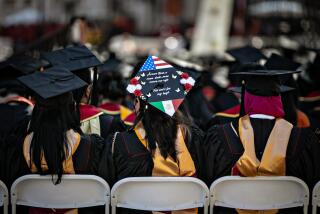A Nation Bereft of Thinkers : No Room for Intellectuals in Our Cultural Ecology
- Share via
U.S. News and World Report recently announced the emergence of a “new American Establishment” based not on wealth or family but “talent, ideas and achievement.”
The old clans and clubs, the newsweekly noted, are succumbing to talented achievers. To prove its point, the magazine surveyed various new Establishments--business, government, culture--but when it reached intellectuals, its confidence waned. Was there a new intellectual Establishment? It listed some new intellectuals, but they were a pretty familiar and crusty lot, averaging almost 60 years of age. As an example of a new figure, the magazine profiled Irving Kristol, a thinker prominent since the 1940s. Where is the new intellectual Establishment or, more simply, where are the younger intellectuals?
Monitoring the state of American intellectuals is not an exact science. Few agree how to identify the species. Perhaps intellectuals could once be found by poking around cafes and bookstores; the man or woman perusing a stack of literary journals would be a good candidate. Nowadays, with up-scale cafes and chain bookstores, it is less clear where to look--airports? malls? think tanks?--or what to look for.
This might be inconsequential except that it matters. Society cannot run for long on “automatic pilot” without a major catastrophe. Intellectuals are required not simply to plot the routes, but also to speak up and out--to announce what is ahead, to state what they are thinking. If they cannot be heard or if they have renounced trying, society is crippled. That is the danger: A society is blind without philosophers, critics, interpreters.
There is little reason to romanticize intellectuals; Americans rarely have. Americans have always distrusted those who have thought too much and done too little. (“If you’re so smart, why ain’t you rich?”) Where is the parent proud that a son or daughter wants to be a writer or poet? In the American ethos, doing for the sake of doing ranks higher than thinking for the sake of thinking.
Almost 25 years ago Richard Hofstadter published a Pulitzer Prize-winning book on American “anti-intellectualism.” Troubled by the resounding defeat of Adlai Stevenson, the “egghead” intellectual, by Dwight D. Eisenhower in 1956, Hofstadter examined what he called America’s “resentment and suspicion of the life of the mind.” He surveyed anti-intellectualism from its religious roots through Eisenhower, who attacked the “many wisecracking so-called intellectuals.” Yet Hofstadter admitted that anti-intellectualism was probably cyclical; as he wrote, John F. Kennedy was in office and intellectuals were streaming toward Washington.
Five Presidents later, how is the patient? The presidential essence and tone seem uncontaminated by intellectualism. Students of the American presidency have long complained of its worsening intellectual timber. Early Presidents like Thomas Jefferson, John and John Quincy Adams and James Monroe were drenched in ideas; they read and digested the thinkers of their day. The more recent American Presidents couldn’t care less. Ronald Reagan marks a low, probably difficult to surpass. He reads little or nothing; anecdotes are his forte, not ideas and knowledge. But does it matter for the larger intellectual life whether the President is friend or foe, interested or indifferent?
It matters insofar as the culture is increasingly peopled with heroes fabricated with glitz and hype. If Presidents do not challenge this world, who can or will? After five or six hours of television a day, is it a wonder that American children care little for reading and thinking? Or is it surprising if students only want to study business or pre-law or pre-real estate when society worships dollars and developers? While doom-sayers like Allan Bloom indict a series of convenient targets--rock music, relativism, feminism, “the ‘60s”--for undermining intellectual life, the causes are surely the deeper social and economic realities.
These realities do not respond to presidential elections; they did not arrive with Reagan nor will they disappear with him. An inspection reveals that over the last 30 years the occupation structure of intellectual life has changed. Herein lies the difficulty of finding the youthful vigorous thinkers hanging about bookstores and cafes. They are not there. Developers bulldozed the cafes and cheap apartments to put up malls and condominiums. The underpaid writers saw, if not the graffiti on the wall, the want ads in the newspapers: “Positions available at new branch of State University. All fields.” During the 1950s and ‘60s higher education rapidly expanded and independent intellectuals traded their turtlenecks for tweeds.
The occupational shift shaped, and probably damaged, American thinkers; they have increasingly flourished as specialists. This has especially affected the younger intellectuals who grow up on a diet of departmental meetings, imperatives, contributions. The field, or more exactly, the sub-field, is everything; the larger picture and world nothing.
If this specialization marks progress, it also indicates regression; younger intellectuals, locked into academic departments and careers, hardly contribute to public discussions. This partly explains why the “new” intellectual Establishment looks so old. Only older intellectuals--the Irving Kristols, the John Kenneth Galbraiths, the William F. Buckleys--continue to play public roles as intellectuals, not because they are older but because their language and life reflect a world before universities set the terms.
Any summary of intellectual life is risky; just as the judgment is passed on declining intellectual life, new centers emerge. For instance, in recent years intellectuals linked to conservative think tanks have forcefully joined public discussions. Yet often they are not only specialists, policy analysts, they are point men in an effort to dismantle social programs and services. The larger problem, if difficult to measure, remains serious. On one hand, a society idolizing media, business and sports stars allows little space for public intellectuals. On the other hand, younger intellectuals who might fill or make a space are hardly interested; they are professors preoccupied with their sub-disciplines.
The remaining more general and public intellectuals--not a new but a graying Establishment--are an endangered species with no progeny and a threatened habitat. When they disappear, the cultural ecology, society’s balance of thought and action, may be irreparably damaged.
More to Read
Sign up for our Book Club newsletter
Get the latest news, events and more from the Los Angeles Times Book Club, and help us get L.A. reading and talking.
You may occasionally receive promotional content from the Los Angeles Times.









